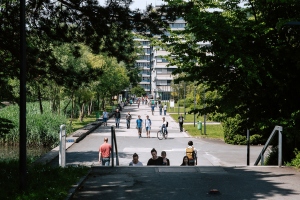
Daniel Dörler
Citizen Science Lecture Series - new lecture
Tomorrow is the next lecture in our citizen science lecture series. Gernot Neuwirth from Naturschutzbund Österreich will tell us all about naturbeobachtung.at. You can still register for the lecture until 21.04.2021 at 08:00 in the morning. You can find the link to the registration as well as a short summary of the lecture in the current blog post.
New lecture in citizen science lecture series
The next lecture in our citizen science lecture series has been announced. In the current blog post you can find all the information about this lecture, which will take place on 21 April.
Johannes Kepler University Linz
Johannes Kepler University Linz, founded in 1966, is with its four faculties and three schools a broad-based university with an overall focus on technology. The understanding of technology is inter- and transdisciplinary and forward-looking. It is based on a strong foundation in the fields of technology, science, economics, law and medicine that is unique in its interplay. The JKU sees itself as a regionally rooted and at the same time internationally oriented university. For its students, the JKU has often taken on a pioneering role in the past – for example, with Austria’s very first degree programmes in computer science and mechatronics – and today’s nearly 23,000 students are offered a wide range of studies at the highest level on a beautiful campus.
In addition to the excellent basic research, which has been widely acknowledged, the transfer of knowledge into business and society has been a major concern for the JKU from the outset. For example, the Institute Integriert Studieren has been carrying out citizen science projects together with non-professionals for many years, in which developments in the field of Assistive Technologies are promoted. Activities in the field of Citizen Science are constantly being expanded.

For the Johannes Kepler University Linz:
Vice- Rector for Innovation und Researchers, Dipl.-Ing. Christopher Lindinger, MAS
New calls
New grants and jobs can be found in the Open Calls section. Take a look, maybe there is just the right funding for you!
MOOC Vielfalter
The first MOOC has been published in the Viel-Falter project. In the current blog post you can find the link to the MOOC and also learn what it can do.
Citizen Science Pub Quiz second round
To all fans of our Citizen Science Pub Quiz: on 07 April it enters the second round! You can find all the details in the current blog post.
New: Fossilfinder-App
Brand new and ready for you: The new Fossilfinder app! All info on the project page and in the current blog post!
New articles in the Special Issue
Two new articles have been published in our Special Issue on Citizen Science and the SDGs. You can read them in our blog post and also find the links to the full versions available for free!
Blogposts on the citizen science lecture series
Our citizen science lecture series inspires you to think! Two seminar papers from last semester, written by BOKU students as part of the lecture series, have now been published on the blog. Congratulations to Cäcilia Wimmler and Lukas Schönmann for their great work!
PATIO Study
Take part in a study on prostate cancer until 28th of February. You can find all the information in the new blog post!


